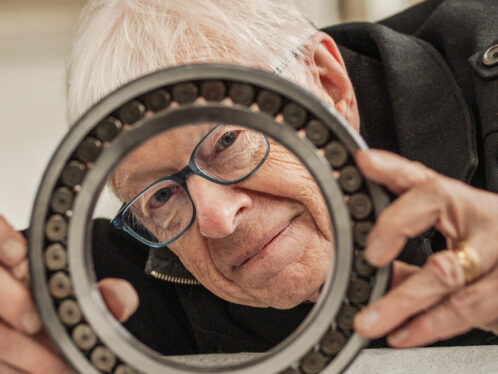
Lena Treschow Torell – Mission: technology for the benefit of society
Technological developments over the past 50 years have triggered globalization and lifted millions of people out of poverty, says Lena Treschow Torell, former president of the Royal Swedish Academy of Engineering Sciences. Technology is still the answer, she says, in solving such current problems as climate change and energy shortages.
Technological developments over the past 50 years have triggered globalization and lifted millions of people out of poverty, says Lena Treschow Torell, former president of the Royal Swedish Academy of Engineering Sciences. Technology is still the answer, she says, in solving such current problems as climate change and energy shortages.
Founded in 1919, the Royal Swedish Academy of Engineering Sciences (Ingenjörsvetenskaps-akademien or IVA) is the oldest academy of its kind in the world. As it promotes knowledge exchange and bridge-building between the worlds of academia, business and politics, the academy plays a distinctly forward-looking role in shaping future society. This role has been further accentuated under the presidency of Lena Treschow Torell, who brings solid experience from all three sectors.
Treschow Torell is a professor of physics and a member of the Swedish government’s Globalization Council. She also sits on the boards of several multinational corporations (including SKF). Through these roles she participates in many senior-level projects on a national and international level. For Treschow Torell, research and technology for the benefit of society is a key driving force, both for the academy and for herself personally.
“Never before in the history of mankind have so many people been raised from poverty to prosperity in such a short time,” says Treschow Torell. She points out that the percentage of people in the world who are living in extreme poverty has fallen from 40 percent in 1980 to around 15 percent today.
“Fewer people go hungry,” she says, “and malnutrition is decreasing rapidly, as is the incidence of child labour, thanks to the growing number of global companies that offer job opportunities in developing countries, which means parents can afford to send their children to school instead of relying on their income.” This, Treschow Torell says, is the result of increased trade and integrated economies, which in turn are the result of globalization spurred by technological developments in transport and communication.
She argues that despite the environmental impact of escalating industrialization, traffic and urbanization, new technology has improved the quality of life for hundreds of millions.
Treschow Torell points to strides made in the world’s major cities. “As recently as the 1950s, soot emissions from coal heating killed tens of thousands of people in London annually,” she says. “Today the water of central Stockholm is so clean you can swim there, and the air quality of Tokyo, for example, has improved drastically.”
Some might arguethat technological progress and rising standards of living are mixed blessings, especially as climate change and resource depletion soar to the top of the world’s priority list. Treschow Torell agrees that these threats are real, but she remains optimistic.
“We have managed to combat environmental challenges with the help of technology before,” she says. “Today’s problems are undoubtedly of another magnitude, but so is our potential to resolve them.”
Treschow Torell stresses that political decisions and international cooperation are equally important in making things happen. Between 1998 and 2001 she served as research director of the Joint Research Centre at the European Commission in Brussels, a position that made her aware of the importance of researchers and scientists in furnishing the political establishment with input in the decision-making process.
“I realized how much today’s political decision makers need scientists in order to take a position on complex and often ethical issues such as, for
example, genetically modified food and pharmaceuticals,” Treschow Torell says. “As scientists, we can offer a basis for political decisions and provide arguments, but we don’t have to arrive at the ‘right’ decision.”
In Treschow Torell’s view, political decisions are also important when it comes to safeguarding a nation’s basic research capabilities. She believes public funding should be steered towards those areas where a country has a competitive advantage, based on experience and tradition.
“I advocate a national research strategy, anchored at a top governmental level, that allocates resources to the industries that matter most to a country’s economic growth in a 10- to 15-year perspective,” she says. “Sweden is still lacking such a strategy.”
When it comes to more specialized, applied research, private companies can often be trusted to come up with necessary funds, especially if the results can be translated into marketable goods. Treschow Torell herself has a foot in the business community and does not see a problem in private enterprise funding and controlling certain research areas. She points out that global corporations play an important role in transferring technology to developing markets.
“Trade and multinational companies have contributed to the development of democracy and welfare throughout the world,” Treschow Torell notes. But she warns that the growing power of global corporations needs to be monitored in order to prevent the situation from being perceived as a democracy gap by the public.
The solution, Treschow Torell says, is to establish corporate governance guidelines. This would also benefit the business community by providing a framework that ensures transparency and stability.
Companies need stability, she says, but they also need competent employees to stay on the forefront in the global competition. It is well known that recruiting is becoming increasingly difficult for many companies in the developed world, especially when it comes to technical skills. Treschow Torell, who is president of Euro-CASE, the European Council of Applied Sciences, Technologies and Engineering, says that Europe is facing this problem.
“Over a number of years, the interest among students in pursuing a science education has steadily decreased – with the notable exception of Switzerland, where a positive attitude towards engineering still prevails,” she says. “While Sweden and Germany also have a strong engineering tradition, the younger generation has not picked it up to the same extent. The US has faced similar problems, but it has coped better than Europe because of its the ability to attract Asian students to compensate for the loss of competence.”
Presently, however, the tide has finally turned in favour of technical studies, Treschow Torell says. Globalization is one reason for the resurgence.
“The number of students applying for admission to science studies has finally started rising again, and I think part of the reason is that more and more young people are realizing that competence is crucial in order to compete in the globalized economy,” she says.
Although Treschow Torell left her position as presi-dent of the academy in August 2008 to devote more time to her numerous board assignments, she will return in early 2009 to take on the role of chairman. Despite the change of role, her mission remains the same: to promote technology that benefits society.




